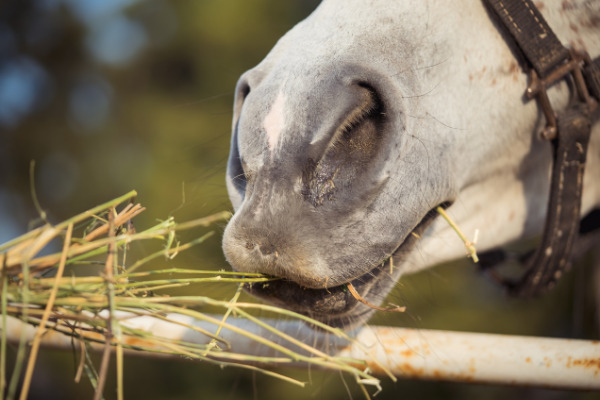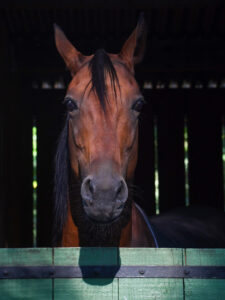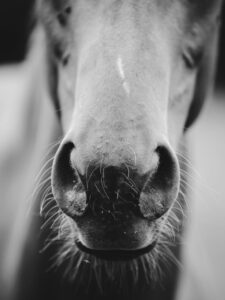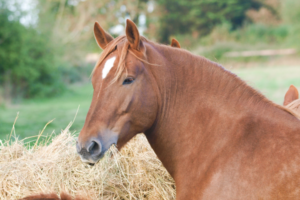We all want our loved ones to be well. Sometimes our horses are stressed, which is triggered by various causes – often it has something to do with their sensitive stomachs. In this article you will find out how you can recognize that your horse is stressed, why stress affects their stomachs and what (feeding) tips we have for stressed horses.
Table of Contents
The horse is a prey animal which means that it is naturally sensitive to stress. Stress activates the flight instinct that has protected it in nature from predators or threatening situations in general. Every horse behaves differently, though. What stresses one horse may be not stressful at all for another.
A basic distinction is made between acute and chronic stress. In acute stress situations, the hormones adrenaline and noradrenaline supply the horse with energy, which enables it to escape quickly. If a stressful situation lasts longer or if the horse is permanently under tension, chronic stress can develop, which usually results in health-related issues for the horse. Stress increases gastric acid production, which irritates the stomach lining and can lead to painful stomach ulcers after only 24 to 48 hours.
Triggers and causes of stress in horses
There can of course be various triggers why horses suffer from stress. Below we briefly describe the most common causes.
Nutrition
Although horses have been domesticated for about 5,000 years, their sensitive gastrointestinal tract has changed little, regardless of their use as recreational or competition horses. The steppe animal is dependent on the constant intake of raw fiber. Horses continuously produce gastric acid, which is necessary for the digestion of forage. Roughage is chewed much more intensively than concentrated feed, which results in more saliva being produced, which in turn contains bicarbonate, a natural stomach acid buffer. If your horse does not have enough roughage, such as good quality hay, this can cause the stomach acid to be insufficiently buffered and irritate the sensitive, glandless stomach lining. Stomach ulcers can be the result. Another aspect is the time it takes to consume roughage. Horses take significantly longer to consume roughage than eating concentrated feed.

Roughage is chewed by horses much more intensively than concentrated feeds
In addition to the basic feed supply, the supply of minerals also has an influence on the horse’s sensitivity to stress. Nowadays, roughage does not usually contain enough minerals, so a well-balanced mineral feed should be supplemented.
Magnesium quickly shows the influence a mineral deficiency can have on horses’ health and stress sensitivity. Magnesium is responsible for stimulus transmission. Along with the amino acid L-tryptophan, it ensures the formation of the hormone serotonin, which in turn is responsible for the well-being and calmness in the horse’s body. If the horse lacks serotonin, it is more quickly irritated or oversensitive. In addition, vital substances such as zinc, cobalt or manganese are also factors of various metabolic processes that are related to mental resilience and nervous strength.
Different ways of keeping horses

If a horse only stands in the stall, it is often stressed
Horses are not only steppe animals but they also need a lot of movement. This means they need as much free movement as possible and permanent access to forage that is high in fiber, water, light, fresh air, contact with fellow species members and a place to rest. If horses cannot act out their natural behavior, this can lead to stress, which causes stereotypes, for example. Stress can occur in both individual and group housing. Stalled horses can be stressed by constant activity in the stable aisle, a loud stable radio, or an unloved stall neighbor. In group housing, it is more likely fights over ranks within the herd or a lack of space to lay down that cause the horse’s stress. Sleep in particular has a great influence on the well-being of the horse. If your horse suffers from a lack of sleep, this can result in stress.
Changes in the daily routine
7:00 a.m. Roughage,
8:00 a.m. Concentrated feed,
9:00 a.m. goes grazing,
2:00 p.m. it goes back to the stable,
5:00 p.m. gets exercised,
6:30 p.m. gets fed roughage,
7:30 p.m. gets fed concentrated feed,
9:00 p.m. stable rest.
Such daily schedules give horses structure and security. If routines are changed again and again, stress will be the result. For example, if horses are not able to graze or are not fed in the same order. It is even more stressful when a horse moves, changes ownerships, or assembles a new herd. Participating in a tournament can also be stressful, starting with the trailer ride for some horses. Oftentimes you as a rider are also tense yourself. The tension is being transferred to your horse, which can therefore also become more nervous.
Injuries
If a horse is injured, stress also arises through the acute pain from which the animal suffers. Especially internal injuries to the joints, but also diseases of organs, especially in the area of the stomach, are not recognizable for humans, but cause our four-legged darlings enormous discomfort. There are numerous consequences associated with injuries, since it is not uncommon for horses to have to stay in the stable and not be allowed to go out to graze or train. This leads to boredom, loneliness or fear of loss – and in the long run also to stress.
Being overchallenged / underchallenged
Horses can also become stressed if they are over- or underchallenged when riding or in everyday stable life. Overchallenging occurs when, for example, you as a rider demand too much from your horse. Young horses in particular should be introduced to everything gently and have as positive of an experience as possible. Excessive demands result in reluctance, fear and muscle tension. Underchallenging, in training, for example, can lead to bad habits due to boredom and lack of drive.
Horse is stressed – Symptoms & Signs
Horses show different symptoms of stress. You as the owner know your horse best. A regular observation of the horse’s behavior is useful so that you can react quickly and perhaps avoid worse. We have compiled a few concrete signs of stress in horses for you here:

Anxious or aggressive behavior can be signs of stress
- Fearful, aggressive or restless behavior
- Decreased / no concentration while riding
- Increased skittishness
- Swinging the tail
- Sweating (at rest)
- Increased neighing
- Empty chewing and gnashing teeth
- Unusual eating behavior (e.g. loss of appetite)
- Frequent diseases due to a weak immune system
- Diarrhea or fecal water
- Mild colic
- Gastric mucosal irritation
- Gastric ulcers
- Stereotypes (bobbing, weaving, etc.)
Where these signs of stress occur, however, always varies. Some horses show up particularly nervous in their stalls, whereas others are not themselves in the barn alley – depending on what the trigger of the stress is.
Stress causes nausea
The stomach of a horse is roughly divided into two zones. The glandular mucosa is located in the lower part of the stomach and is protected from stomach acid. Normally, gastric acid does not enter the glandless, unprotected upper part of the stomach. However, if the stomach acid is not sufficiently buffered or if there is a particularly large amount of stomach acid, the stomach acid can “spill over” during movement, for example when riding, and irritate or even damage the glandless mucosa. Painful stomach ulcers are the result. Today, approximately 50% of foals, 40% of pleasure horses, 60% of show horses and 90% of racehorses have gastric ulcers, so on average every second horse is affected.
Excess stomach acid due to stress
Stomach acid is very important for the horse because, among other things, it ensures that germs and undesirable bacteria in the feed are killed. In addition to this continuous gastric acid production, stress-induced acidity can occur. The stress hormone cortisol additionally stimulates gastric acid production, resulting in an excess of acid that irritates the gastric mucosa and can cause gastric ulcers after only 24 to 48 hours. These ulcers usually cause horses great pain, which in turn leads to stress – a vicious circle!
But it is not only the stomach that is irritated by stomach acid. The feed mash, which is saturated with acid, passes from the stomach into the intestine in an over-acidified state. The microbes that digest the food in the intestine cannot develop their full effect due to the excessively high pH value or, in the worst case, even die off. The result: a disturbed intestinal flora, which leads to digestive disorders, diarrhea, flatulence and fecal water.
Your horse is stressed? This is how you need to react!
You think your horse is suffering from stress and want to do something about it? First of all, if you suspect that your horse is already suffering from stress-related health problems, you should definitely contact a veterinarian to have your horse examined.
Of course, there are also some things that you as a rider can do yourself to help your horse feel less stressed. It is important that you always have a lot of patience and don’t let your horse stress you out – because our sensitive best friends notice this immediately and can become even more stressed themselves.
We have the following tips for you:
-

Especially roughage should always be available for your horse
Pay attention when feeding: A well-balanced diet is very important for a horse. Especially roughage should always be available for your horse.
- Keep your horse busy: Boredom can also be a trigger for stress. So give your horse as much exercise as possible.
- Create routines: As mentioned earlier, horses are creatures of habit. The more routines you integrate into your horse’s daily routine, the more safe your horse will feel.
- Observe your horse’s behavior: Does your horse react stressed in his environment? Does it get along with his stall neighbor or herd members?
- Create positive associations: Regularly reward your horse so that he associates certain situations (riding in a trailer) with something positive.
- Stay calm: Always stay calm yourself to make your horse feel more at ease. If you are nervous, your horse often notices it immediately.
The article What can I do when my horse is stressed you learn more about this important topic.
Feeding tips for stressed horses
Feeding plays a major role in keeping your horse healthy. Roughage, good quality hay, for example, is the most important feed besides water, which should always be available to your horse. In addition, horses can cover a large part of their daily energy needs through roughage. You should avoid frequent feed changes, because the intestinal microbes have to adjust to the new food over and over. You can actively help your horse and contribute to its well-being, by supporting the sensitive stomach with supplements.


